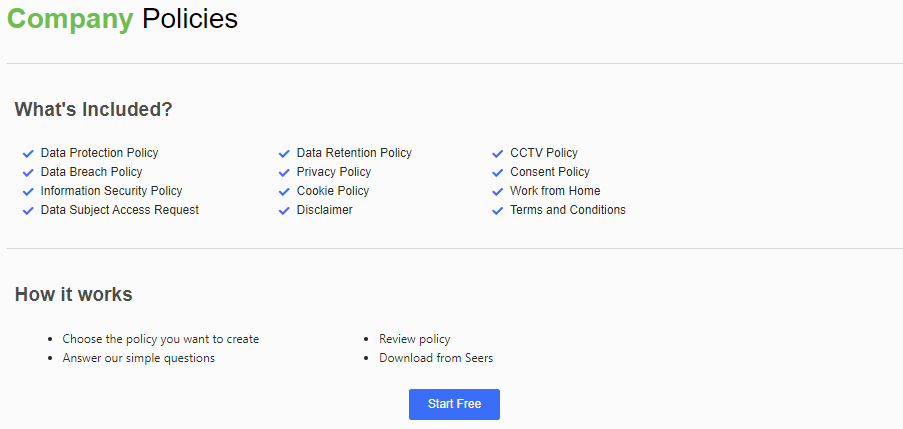Are you worried about how to protect your users’ data and comply with strict privacy laws? Unsure if your current privacy practices are enough to avoid legal trouble?
In today’s digital world, handling personal data without the right safeguards can lead to hefty fines, lost customer trust, and serious damage to your business reputation.
A comprehensive privacy policy that not only explains your data practices but also ensures you meet legal requirements like GDPR and CCPA.
In this article, we’ll explore what a privacy policy is, why it’s essential, and how to craft one that meets legal requirements while building trust with your users.
What is a Privacy Policy?
The privacy policy of an organisation is a legal statement that states the purpose of collection and use of personal data by an organisation. The purpose of the privacy policy is to ensure transparency by disclosing certain information and to obtain the informed consent of the users whose personal data is being collected.
Governments worldwide have set stringent rules to ensure businesses protect user data. Here are some of the most important regulations that affect privacy policies:
- GDPR: This European regulation is known for its strict guidelines around user consent and data protection.
- CCPA: California’s privacy law grants residents the right to know what data is collected and to request its deletion.
- HIPAA: For healthcare companies, HIPAA governs how medical information must be protected.
In 2019, the FTC fined Facebook $5 billion for improperly handling user data. A strong privacy policy and transparent data practices could have avoided such a significant penalty.
The importance of a privacy policy
The privacy policy is an essential requirement within an organisation. Organisations are now required to ensure that their data collection practices are compliant under GDPR.
An organisation with no privacy policy is non-compliant with Article 13 and 14 of the GDPR; hence, it could face legal action.
Why Do You Need a Privacy Policy?
A privacy policy is often a legal requirement, not just a suggestion. But beyond the legal requirements, a privacy policy builds trust between you and your users.
Here’s why it’s essential:
- Legal Compliance: Laws like GDPR and CCPA mandate businesses to have a privacy policy. Failing to comply can result in hefty fines. For example, Google was fined €50 million by French authorities in 2019 for failing to comply with GDPR.
- Transparency and Trust: More users are growing cautious about how businesses handle their data. According to a 2020 survey by Cisco, 84% of consumers care deeply about their data privacy, and 48% have already switched companies because of their data policies.
- Risk Mitigation: A privacy policy limits your liability. Should a data breach occur, having a clear privacy policy helps protect your business from lawsuits.
Whether you run a blog, an app, or an e-commerce store, a privacy policy is essential. Take Shopify, for example. Their privacy policy clearly outlines how they collect payment information, ensuring users feel confident about sharing their sensitive details online.
Essential Components of a Privacy Policy
A well-designed privacy policy should address specific elements to ensure users are fully informed about your data practices. Some critical components that every privacy policy should cover are
- Types of Data Collected: Explain what personal data you collect, such as:
- Name
- Email address
- Payment information
- IP addresses
- Geolocation
- How Data is Collected: Let users know if data is collected directly (through forms) or indirectly (through cookies or tracking technologies).
- Purpose of Data Collection: Specify why you collect data. Common reasons include:
- To process payments
- For marketing purposes
- To improve user experience through analytics
- Third-Party Sharing: Be transparent about any data you share with third parties. e.g., for payment processing or marketing services
- Data Retention: State how long you store personal information.
- User Rights: Inform users about their rights, including:
- The right to access their data
- The right to correct or delete data
- The right to withdraw consent
For an e-commerce privacy policy, these components are particularly important, especially around payment and transaction data. In contrast, a privacy policy for blogs might focus more on how you collect and use email addresses for newsletters or comment sections.
Privacy Policy for Specific Platforms
Different types of businesses have different privacy requirements; your privacy policy should reflect those differences. Here’s how it may vary by platform:
- E-commerce Websites: You’ll need to mention how you handle sensitive information like payment details, customer addresses, and shopping histories.
- Blogs: Focus on how you manage user data such as emails or IP addresses for comments.
- Mobile Apps: If your app collects data like geolocation or device IDs, explain how that data is used and shared.
For example, Sephora had to settle with California’s Attorney General in 2022 for non-compliance with the CCPA. Sephora sold personal data to third parties.
Privacy Policy Templates and Generators
If you struggle to create a custom privacy policy, templates and generators can help simplify the process. Many platforms offer free privacy policy templates or generators tailored to your specific business needs.

Seers data privacy policies are particularly helpful for small businesses, blogs, or startups that can’t afford to hire a legal team to draft policies from scratch.
Best Practices for Writing a Privacy Policy
A well-written privacy policy should be concise and easy to understand. Here are some best practices:
- Use Simple Language: Avoid legal jargon. Users need to understand what they’re agreeing to. According to a Pew Research Center study, 52% of Americans don’t fully understand privacy policies, partly due to complex language.
- Be Transparent: Be honest about how you collect and use data. Transparency builds trust.
- Consent is Key: Explicitly ask for gdpr policy and privacy policy consent where necessary. If you use cookies, make sure you have a cookie privacy policy and ask for consent before collecting any data.
For example, Google’s privacy policy breaks down complex data practices into simple, straightforward language. This transparency has helped them maintain user trust, even as their data practices grow more complicated.
Updating Your Privacy Policy
Keeping your privacy policy up-to-date is crucial, especially as your business evolves. Both GDPR and CCPA require companies to inform users of any significant changes.
- When to Update:
- If you introduce new services or features.
- If regulations change, for example, the introduction of new state-level privacy laws in the U.S.
- If you change how you collect or use data (e.g., implementing new tracking cookies).
In 2021, WhatsApp faced significant backlash when it updated its privacy policy to share more data with Facebook. They didn’t communicate the update clearly. This led to user distrust and public outcry. To avoid a similar situation, be upfront and clear when you update your privacy policy.
Privacy Policy vs. Terms of Service
The following table shows the key differences between a privacy policy and terms of service.
| Privacy Policy | Terms of Service |
| It covers how you handle user data. | Describes the rules users must follow when using your service. |
| Informs users about data collection, storage, and usage. | Outlines the relationship between you and your users. |
| Required by law in most jurisdictions. | Typically covers intellectual property, usage restrictions, and disclaimers. |
While both are important, they should be kept separate. For instance, Apple’s terms of service explain the rules for using its products, while its privacy policy focuses on how it handles personal data like Apple ID and iCloud data.
How Privacy Policies Help with Legal Compliance
A privacy policy not only informs your users but also protects your business legally. Regulatory bodies like the GDPR and CCPA impose strict penalties for non-compliance.
- GDPR Fines: Up to 20 million euros or 4% of annual global turnover, whichever is higher.
- CCPA Penalties: Up to $7,500 per violation.
For example, H&M was fined €35 million under GDPR regulations for secretly collecting personal data about their employees. The company’s privacy practices failed to align with GDPR’s transparency requirements, leading to this significant penalty. A well-crafted privacy policy that adheres to these laws can protect your business from similar fines.
Final Thoughts
A good privacy policy is more than just legal protection—it’s a way to build trust with your audience. As consumers become more privacy-conscious, having a clear, up-to-date, and transparent data privacy policy will give your business a competitive edge.
In conclusion, whether you run a blog, an app, or an online store, a privacy policy is critical for building trust, maintaining legal compliance, and protecting your business from legal challenges.
Seers also provides expert advice, GDPR consultation, and guidance in drafting custom privacy policies. So, If you need assistance in this regard, then feel free to contact us.
Seers Privacy Policy
Overview:
- Seers offers a comprehensive privacy policy generator designed to help businesses create GDPR, CCPA, and global privacy law-compliant policies in minutes.
Founding Purpose:
- The Seers platform was developed with a vision to simplify the process of compliance, ensuring businesses can protect user data and avoid fines while maintaining seamless operations.
Passion and Motivation:
- At Seers, we are deeply committed to making privacy compliance effortless. Our mission is to empower businesses to protect their users’ data while building trust and fostering growth.
What We Offer:
- Customisable privacy policies tailored to your specific business needs.
- Easy setup for websites, apps, and e-commerce platforms.
- Regular updates to ensure your policy stays compliant with the latest regulations.
- Complete legal protection and risk mitigation for your business.
Partnership Opportunities:
- Seers is here to support you in achieving both compliance and growth. Let’s work together to safeguard your business’s data privacy.
Want to see how Seers can help you achieve compliance and build trust?
Book Your Demo Now

